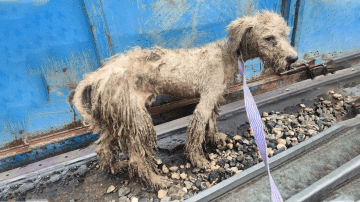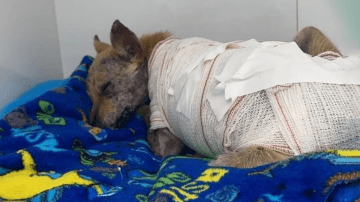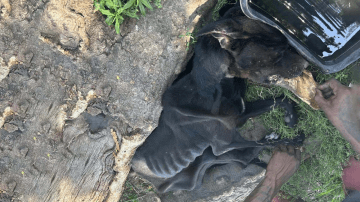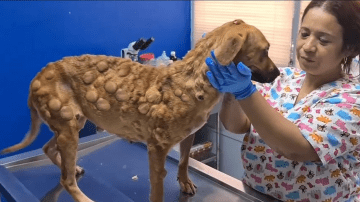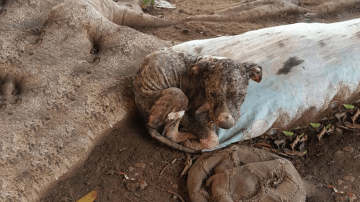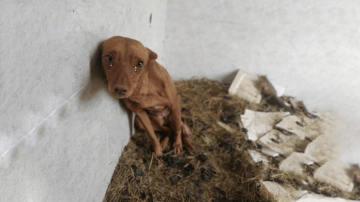The afternoon sun was weak, its pale light slipping through the canopy and scattering across the still surface of the water. A little wolf, no older than a few months, lifted its head just above the edge of the deep water hole. Its gaze was not fierce, not wild—it was desperate. For two endless days, the creature had been trapped there, its tiny body soaked to the bone, shivering as the cold crept deeper into its muscles. Hunger gnawed at its belly, and exhaustion weighed down its every breath. It knew it would not survive much longer.

Two days earlier, the wolf had been wandering near the edge of the forest, nose pressed to the ground, searching for scraps of food. Driven by instinct and the pangs of hunger, it had strayed too far. Ahead, the land was not the familiar earth of the woods but a strange human place—a construction site, half-finished and abandoned for the afternoon. There were no scents of prey here, only dust, iron, and the faint tang of oil. Yet the wolf pressed forward, and with one unlucky step, its paws slipped. The earth gave way beneath it, plunging the small body into the icy water of a pit dug deep for human work.
The shock of the cold had stolen its strength instantly. At first, it tried to swim, tried to claw its way up the slick concrete walls, but the water dragged at its legs. Each attempt failed, and each failure sapped more hope. Hours turned into a day, then another. Alone in that pit, the wolf felt not just the cold of the water but the cold of despair. And then—just when the last of its strength was fading—footsteps.
Two construction workers were walking nearby, checking equipment, when a faint, broken sound reached them. A howl, but so weak it was almost a whisper. They turned and saw it: a pair of eyes staring up at them from the water, eyes filled not with menace but with pain. The men froze for a moment, unsure. A wolf, even a small one, was still a wild animal. But the look in those eyes was undeniable—it was not danger they saw. It was a plea.

Without hesitation, one of them grabbed a rope. He tied a firm knot, lowered it carefully, and with practiced hands managed to loop it around the animal’s neck. Together, the two men pulled, their muscles straining against the dead weight of the soaked body. The wolf barely moved, too weak even to struggle. Slowly, inch by inch, they lifted it out of the cold prison that had nearly claimed its life.
When the little wolf was finally laid upon the shore, it did not spring to its feet or bare its teeth. It simply collapsed, trembling violently, its breath ragged. Its body was limp, but in its eyes—those dark, glistening eyes—there was a flicker. A faint, fragile ray of hope. One of the men knelt beside it, hesitant. He knew what people said about wolves: dangerous, unpredictable, untamable. Yet in this moment, looking at this shivering bundle of fur, he did not see danger. He saw need. He could not leave it there. So he made a choice that would change both their lives.

The man carried the wolf home. His hands were careful, his steps steady, as though he were holding something fragile, something already half-broken. When they arrived, he gently set the animal on a warm rug by the fire. He dried its fur with an old towel, murmuring quietly, though the wolf did not understand the words. The wolf’s eyes followed every movement, wide with hesitation. It wanted to trust, but fear still lingered.
In the first days, that fear was strong. Whenever anyone approached, the wolf pulled back, pressing itself against corners, its gaze sharp with suspicion. It ate little, only nibbling when no one was watching. It moved stiffly, as though expecting pain to strike at any moment. But the man and his family were patient. They offered food, warmth, and kindness without demanding trust in return. They gave the wolf space, waiting silently each time until it felt safe enough to step forward. And slowly, the walls around its heart began to crumble.
Wounds healed. The scabs across its body softened and disappeared. Its fur, once dull and rough, grew softer, smoother, shining faintly in the light. Each day, the wolf found a little more strength, a little more reason to believe it was safe. It no longer trembled constantly. It no longer turned away from gentle hands. Weeks passed, and something beautiful happened: the little wolf began to live again.
It played. At first cautiously, padding around the yard, sniffing at corners. Then, with more confidence, it began to run—small leaps, quick sprints, bursts of energy that spoke of youth returning. Its tail wagged when it saw the man, an instinct born not of the wild but of affection. The family laughed at its antics, and the wolf seemed to laugh with them, tongue lolling, eyes bright. The man, once fearful of the wild creature he had brought into his home, realized the truth. Behind the sharp teeth and the wary eyes was not a beast to be feared but a soul capable of love, loyalty, and gratitude. The wolf seemed to sense who had saved it, who had cared when no one else would. It was as if the animal understood.

Though fully healed, strong enough to return to the forest, it did not try. The forest had once been its world, but now, this little house had become something greater: a sanctuary. A family. A place where hunger did not gnaw and cold did not bite. The man did not chain it, did not cage it. He simply opened his door each day, and each day, the wolf chose to stay.
Their bond grew deeper with time. The wolf became not just a guest but a companion. It followed the man around the yard, lay at his feet in the evenings, and greeted him at the door with unbridled joy. Neighbors, at first skeptical, soon saw the truth: this was not a dangerous animal. This was a friend. What began as a rescue became something much greater—a story of transformation. The wolf, once trapped between life and death, had been given a chance. And in return, it gave the man something priceless: loyalty beyond words, companionship beyond measure. Kindness had turned fear into trust. Trust had turned survival into love.
In the end, their story is not just about a man and a wolf. It is about the quiet power of compassion. A single choice—a rope lowered into cold water, a hand offering warmth instead of fear—had rewritten the destiny of a creature. The wolf had been pulled not only from a pit of water but from a pit of despair. And the man? He discovered that sometimes, by saving another life, we end up saving something within ourselves.
Their friendship became a living testament: love can tame the wildest fear, and even the smallest act of kindness can ripple outward, changing the world for more than one soul. Because in that moment by the water’s edge, when two desperate eyes met human hands, a wild little wolf didn’t just survive—he found his forever home.

